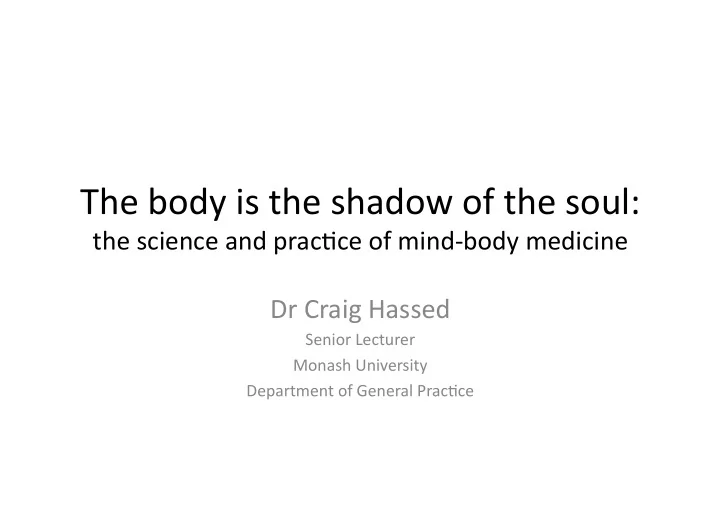

The ¡body ¡is ¡the ¡shadow ¡of ¡the ¡soul: ¡ the ¡science ¡and ¡prac6ce ¡of ¡mind-‑body ¡medicine ¡ Dr ¡Craig ¡Hassed ¡ Senior ¡Lecturer ¡ Monash ¡University ¡ Department ¡of ¡General ¡Prac6ce ¡
Pathophysiological effects of acute psychosocial stress. From: Rozanski: Circulation 1999;99:2192-2217
Psychosocial ¡factors ¡and ¡heart ¡disease ¡ • As ¡a ¡causal ¡factor ¡ – Type ¡A/hos6lity ¡(6/14 ¡studies) ¡ – Depression ¡and ¡anxiety ¡(11/11 ¡studies) ¡ – Work ¡characteris6cs ¡(6/10 ¡studies) ¡ – Social ¡support ¡(5/8 ¡studies) ¡ • As ¡a ¡prognos6c ¡factor ¡ – Type ¡A ¡(0/5 ¡posi6ve ¡studies) ¡ – Depression ¡and ¡anxiety ¡(6/6) ¡ – Work ¡characteris6cs ¡(1/2) ¡ – Social ¡support ¡(9/10) ¡ • Hemingway ¡H, ¡Marmot ¡M. ¡BMJ ¡1999;318(7196):1460-‑7. ¡
Psychosocial ¡interven6ons ¡for ¡CAD ¡ • Meta-‑analysis ¡of ¡23 ¡studies ¡ • Overall ¡reduc6on ¡of ¡odds ¡for ¡new ¡cardiac ¡ events ¡if ¡pa6ents ¡get ¡psychosocial ¡interven6on ¡ as ¡part ¡of ¡care ¡ • Increased ¡risk ¡for ¡those ¡with ¡no ¡psychosocial ¡ therapy ¡as ¡a ¡part ¡of ¡management ¡ – OR ¡1.70 ¡for ¡mortality ¡ – OR ¡1.84 ¡for ¡recurrence ¡ • Linden ¡W. ¡et ¡al. ¡Arch ¡Int ¡Med ¡1996;156(7):745-‑52. ¡
“Man is not disturbed by events, but by the view he takes of them.” Epictetus
Cardiovascular reactivity will be based upon our perception of how threatening the event is Scintigrams - radionuclide ventriculography at rest and then during a mental stress task involving a speech task (speaking about feelings of personal stress concerning his problems in caring for his family). During speech patient had worsening of left ventricular segmental wall motion and abnormal outward motion during systole developed in septum. Rozanski: NEJM
Appraisal ¡and ¡the ¡stress ¡response ¡ • Study ¡examined ¡whether ¡reappraising ¡stress-‑induced ¡arousal ¡ could ¡improve ¡cardiovascular ¡outcomes ¡and ¡decrease ¡ a]en6onal ¡bias ¡for ¡emo6onally ¡nega6ve ¡informa6on ¡ • Par6cipants ¡randomly ¡assigned ¡to ¡either ¡a ¡reappraisal ¡ interven6on ¡(instructed ¡to ¡treat ¡physiological ¡arousal ¡during ¡a ¡ stressful ¡task ¡as ¡func6onal ¡and ¡adap6ve ¡– ¡acceptance) ¡or ¡to ¡1 ¡of ¡ 2 ¡control ¡interven6ons: ¡a]en6on ¡reorienta6on ¡and ¡no ¡ instruc6ons ¡ • Par6cipants ¡instructed ¡to ¡reappraise ¡arousal ¡exhibited ¡more ¡ adap6ve ¡cardiovascular ¡stress ¡responses ¡ – Increased ¡cardiac ¡efficiency, ¡lower ¡vascular ¡resistance, ¡decreased ¡ a]en6onal ¡bias ¡ • Jamieson ¡JP, ¡Nock ¡MK, ¡Mendes ¡WB. ¡Mind ¡over ¡ma]er: ¡reappraising ¡arousal ¡improves ¡ cardiovascular ¡and ¡cogni6ve ¡responses ¡to ¡stress. ¡J ¡Exp ¡Psychol ¡Gen. ¡2012 ¡Aug;141(3): 417-‑22. ¡doi: ¡10.1037/a0025719. ¡
Stress ¡percep6on ¡and ¡health ¡ Study ¡examined ¡rela6onship ¡b/w ¡amount ¡of ¡stress, ¡the ¡percep6on ¡that ¡ • stress ¡affects ¡health, ¡and ¡health ¡and ¡mortality ¡outcomes ¡in ¡U.S. ¡adults ¡ – Controlled ¡for ¡sociodemographic, ¡health ¡behavior, ¡and ¡access ¡to ¡health ¡care ¡factors ¡ 33.7% ¡of ¡adults ¡perceived ¡that ¡stress ¡affected ¡their ¡health ¡a ¡lot ¡or ¡to ¡some ¡ • extent ¡ Both ¡higher ¡levels ¡of ¡reported ¡stress ¡and ¡the ¡percep6on ¡that ¡stress ¡affects ¡ • health ¡independently ¡associated ¡with ¡increased ¡likelihood ¡of ¡worse ¡mental ¡ and ¡physical ¡health ¡outcomes ¡ Those ¡who ¡reported ¡a ¡lot ¡of ¡stress ¡and ¡that ¡stress ¡impacted ¡their ¡health ¡a ¡ • lot ¡had ¡a ¡43% ¡increased ¡risk ¡of ¡premature ¡death ¡ Those ¡with ¡high ¡stress ¡but ¡a ¡percep6on ¡that ¡it ¡had ¡a ¡posi6ve ¡effect ¡had ¡ • lower ¡rate ¡of ¡premature ¡death ¡than ¡those ¡with ¡less ¡stress ¡but ¡nega6ve ¡ percep6on ¡ • Keller ¡A, ¡Litzelman ¡K, ¡Wisk ¡LE, ¡et ¡al. ¡Does ¡the ¡percep6on ¡that ¡stress ¡affects ¡ health ¡ma]er? ¡The ¡associa6on ¡with ¡health ¡and ¡mortality. ¡Health ¡Psychol. ¡ 2012 ¡Sep;31(5):677-‑84. ¡doi: ¡10.1037/a0026743. ¡Epub ¡2011 ¡Dec ¡26. ¡
Stress ¡and ¡MS ¡lesions ¡ Study ¡on ¡whether ¡different ¡types ¡of ¡stressful ¡events ¡and ¡perceived ¡stress ¡ • predict ¡the ¡development ¡of ¡MS ¡brain ¡lesions ¡ 121 ¡pa6ents ¡with ¡MS ¡followed ¡for ¡48 ¡weeks ¡during ¡an ¡RCT ¡comparing ¡stress ¡ • management ¡therapy ¡for ¡MS ¡(SMT-‑MS) ¡to ¡a ¡waitlist ¡control ¡(WLC) ¡ – MRI ¡scans ¡every ¡8 ¡weeks ¡to ¡measure ¡brain ¡lesions ¡ – Monthly ¡interviews ¡measured ¡stressful ¡life ¡events ¡and ¡self-‑report ¡measures ¡of ¡perceived ¡ stress, ¡anxiety ¡and ¡depressive ¡symptoms ¡ – Par6cipants ¡classified ¡stressful ¡events ¡as ¡posi6ve ¡or ¡nega6ve ¡ Posi6ve ¡stressful ¡events ¡predicted ¡decreased ¡risk ¡for ¡lesions ¡in ¡the ¡control ¡ • group ¡(OR ¡0.53 ¡for ¡each ¡addi6onal ¡posi6ve ¡stressful ¡event) ¡and ¡less ¡risk ¡for ¡ new ¡or ¡enlarging ¡lesions ¡regardless ¡of ¡group ¡assignment ¡(OR ¡0.74) ¡ Major ¡nega6ve ¡stressful ¡events ¡predicted ¡lesions ¡(OR ¡1.77) ¡and ¡new ¡or ¡ • enlarging ¡lesions ¡(OR ¡1.57) ¡whereas ¡moderate ¡nega6ve ¡stressful ¡events, ¡ perceived ¡stress, ¡anxiety ¡and ¡depressive ¡symptoms ¡did ¡not ¡ • Burns ¡MN, ¡Nawacki ¡E, ¡Kwasny ¡MJ, ¡Pelle6er ¡D, ¡Mohr ¡DC. ¡Do ¡posi6ve ¡or ¡nega6ve ¡stressful ¡events ¡ predict ¡the ¡development ¡of ¡new ¡brain ¡lesions ¡in ¡people ¡with ¡mul6ple ¡sclerosis? ¡Psychol ¡Med. ¡2013 ¡ May ¡17:1-‑11. ¡
Yogic ¡medita6on, ¡genes ¡and ¡immunity ¡ • Study ¡on ¡effect ¡of ¡Yogic ¡medita6on ¡on ¡gene6c ¡expression ¡ • 68 ¡genes ¡were ¡found ¡to ¡be ¡differen6ally ¡expressed ¡(19 ¡up-‑ regulated, ¡49 ¡down-‑regulated) ¡ajer ¡adjus6ng ¡for ¡poten6ally ¡ confounded ¡differences ¡in ¡sex, ¡illness ¡burden, ¡and ¡BMI ¡ • Up-‑regulated ¡genes ¡included ¡immunoglobulin-‑related ¡genes ¡ • Down-‑regulated ¡genes ¡included ¡pro-‑inflammatory ¡cytokines ¡ • Black ¡DS, ¡Cole ¡SW, ¡Irwin ¡MR, ¡et ¡al. ¡Yogic ¡medita6on ¡reverses ¡NF-‑κB ¡and ¡IRF-‑related ¡ transcriptome ¡dynamics ¡in ¡leukocytes ¡of ¡family ¡demen6a ¡caregivers ¡in ¡a ¡ randomized ¡controlled ¡trial. ¡Psychoneuroendocrinology. ¡2013 ¡Mar;38(3):348-‑55. ¡ doi: ¡10.1016/j.psyneuen.2012.06.011. ¡
Medita6on ¡and ¡inflamma6on ¡ • Novice ¡meditators’ ¡Inflammatory ¡markers ¡(serum ¡interleukin ¡ (IL)-‑6 ¡levels) ¡were ¡41% ¡higher ¡than ¡those ¡of ¡expert ¡meditators ¡ • The ¡odds ¡of ¡a ¡novice ¡having ¡detectable ¡C-‑reac6ve ¡protein ¡ (CRP) ¡(a ¡marker ¡of ¡inflamma6on) ¡were ¡4.75 ¡6mes ¡as ¡high ¡as ¡ that ¡of ¡an ¡expert ¡ • Differences ¡in ¡stress ¡responses ¡between ¡experts ¡and ¡novices ¡ provided ¡one ¡plausible ¡mechanism ¡for ¡their ¡divergent ¡ inflammatory ¡response ¡to ¡stress ¡ • Kiecolt-‑Glaser ¡JK, ¡Chris6an ¡L, ¡Preston ¡H, ¡et ¡al. ¡Stress, ¡inflamma6on, ¡and ¡yoga ¡ prac6ce. ¡Psychosom ¡Med. ¡2010 ¡Feb;72(2):113-‑21. ¡doi: ¡10.1097/PSY. 0b013e3181cb9377. ¡
Recommend
More recommend